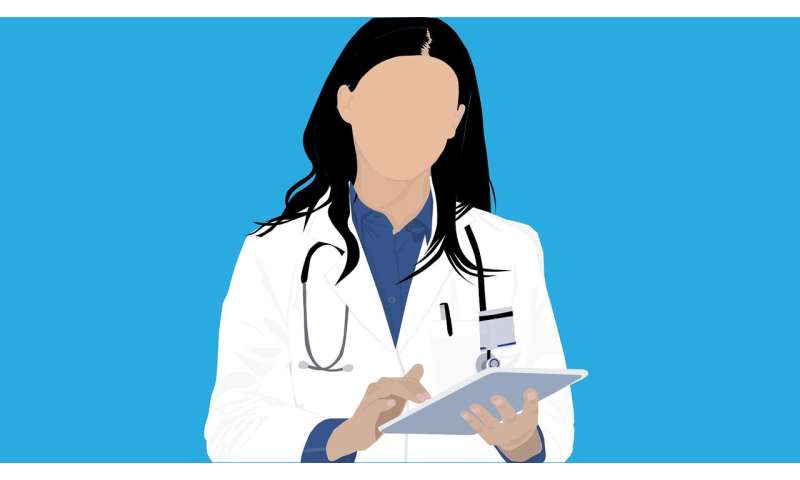
Healthcare workers are 7 times as likely to have severe COVID-19 infection as those with other types of 'non-essential' jobs, finds research focusing on the first UK-wide lockdown and published online in the journal Occupational & Environmental Medicine.
And those with jobs in the social care and transport sectors are twice as likely to do so, emphasising the need to ensure that essential (key) workers are adequately protected against the infection, say the researchers.
Few studies have looked at the differences in the risk of developing severe COVID-19 infection between different groups of workers. While it's known that those working in healthcare roles are at heightened risk, it's not clear what the risks might be for those working in other sectors.
The researchers therefore compared the risk of developing severe COVID-19 infection in essential and non-essential workers, drawing on linked data from the UK Biobank study (2006-10), COVID-19 test results from Public Health England, and recorded deaths for the period 16 March to 26 July 2020.
The UK Biobank is a long term study tracking the factors potentially influencing the development of disease in around half a million middle and older age adults.
Severe infection was defined as a positive test result for SARS-CoV-2, the virus responsible for COVID-19, while in hospital, or death attributable to the virus.
The study included 120,075 employees aged 49-64. Of these, 35,127 (29%) were classified as essential workers: healthcare (9%); social care and education (11%); 'other' to include police and those working in transport and food preparation (9%)
Those of Black and Asian ethnicities comprised nearly 3% each of the total. They were more likely to be essential workers, as were women.
In all, 271 employees had severe COVID-19 infection. Healthcare professionals, defined as doctors and pharmacists; medical support staff; health associate professionals, defined as nurses and paramedics; and social care and transport workers had higher rates of severe COVID-19 than non-essential workers.
Compared with non-essential workers, those working in healthcare roles were more than 7 times as likely to have severe infection.
And those working in social care and in education were 84% as likely to do so; while 'other' essential workers had a 60% higher risk of developing severe COVID-19.
When the researchers refined the employment categories further, it emerged that medical support staff were nearly 9 times as likely to develop severe disease; those in social care almost 2.5 times as likely to do so; while transport workers were twice as likely to do so.
And when the researchers looked at the impact of ethnicity, they found that the risks of severe infection for Black and Asian non-essential workers were similar to those for white essential workers, suggesting that ethnicity is a key factor.
Non-essential workers of Black and Asian backgrounds were also more than 3 times as likely to develop severe COVID-19 infection as white non-essential workers, while Black and Asian essential workers were more than 8 times as likely to do so.
With the exception of transport workers, for whom heightened risk of severe COVID-19 infection was linked to socioeconomic status, the findings held true even after accounting for potentially influential risk factors, including lifestyle, co-existing health problems, and work patterns.
This is an observational study, and therefore can't establish cause. And the authors acknowledge that their initial background data were collected more than a decade ago, so they were unable to account for any changes in health, lifestyle, income and employment status. The UK Biobank is also not representative of the broader population.
Nor were the researchers able to take account of the changes in risk over time, such as the availability of personal protective equipment (PPE). Nevertheless, the findings echo those of other studies, they point out.
And they conclude: "Our findings reinforce the need for adequate health and safety arrangements and provision of PPE for essential workers, especially in the health and social care sectors. The health and wellbeing of essential workers is critical to limiting the spread and managing the burden of global pandemics."
Explore further
Citation: Healthcare workers 7 times as likely to have severe COVID-19 as other workers (2020, December 8) retrieved 8 December 2020 from https://ift.tt/36VnVKC
This document is subject to copyright. Apart from any fair dealing for the purpose of private study or research, no part may be reproduced without the written permission. The content is provided for information purposes only.
"severe" - Google News
December 09, 2020 at 06:30AM
https://ift.tt/36VnVKC
Healthcare workers 7 times as likely to have severe COVID-19 as other workers - Medical Xpress
"severe" - Google News
https://ift.tt/2OrY17E
Shoes Man Tutorial
Pos News Update
Meme Update
Korean Entertainment News
Japan News Update
Bagikan Berita Ini















0 Response to "Healthcare workers 7 times as likely to have severe COVID-19 as other workers - Medical Xpress"
Post a Comment